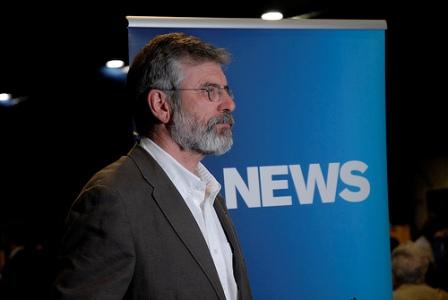 Are Sinn Féin gaining respectability as a political party in Ireland or are we just seeing a backlash from voters protesting against a Fianna Fáil party in power, latter currently unable to demonstrate the slightest semblance of real leadership.
Are Sinn Féin gaining respectability as a political party in Ireland or are we just seeing a backlash from voters protesting against a Fianna Fáil party in power, latter currently unable to demonstrate the slightest semblance of real leadership.
Denied allegation, this week, that Fine Gael, now Ireland’s largest political party in opposition, might be interested in meeting Sinn Féin regarding a possible future coalition partnership, suggests that all political parties are doing their mathematics based on recent election results.
Take a look at the current state of play:
Sinn Féin gained new County Council seats in Carlow, Cavan, Clare, Cork, Kilkenny, Limerick, Mayo, Offaly, Tipperary, Waterford and Wicklow. Sinn Féin held up and improved upon its substantial 2004 performance in local and EU elections. Across the five EU constituencies on this island, Sinn Féin took a massive 331,797 votes and 14.34% of the all-Ireland vote.
In the County Council elections Sinn Féin entered the election with 51 seats and came out of the poll with 54 County Ccouncil seats and 67 Town Council and Borough seats. Seamus Morris was elected on the 9th Count to the Nenagh ward of Tipperary North Council with 8.7% of first preferences, securing Sinn Féin’s first seat on that Council since 1957. Morris also won a seat on Nenagh Town Council. David Doran held on to his seat on Thurles Town Council.
In Tipperary South Kevin Brunnick took 2.8% of the votes in Cahir while in Fethard David Dunne won 5.1% of first preferences.
Liam Walsh held his seat on Carrick-On-Suir Town Council as did Michael Browne in Cashel.
In Northern Ireland Sinn Féin MEP Bairbre de Brún was re-elected to the European Parliament, topping the poll in the Six Counties in last week’s EURO elections. This was indeed a truly historic development as de Brún is the first nationalist to top the poll and Sinn Féin is now the largest party in the North of Ireland. De Brún, elected on the first count, broke a record held by the DUP since 1979. The Sinn Féin MEP got 126,184 votes and was the only candidate to reach the quota on the first count. The Democratic Unionist Party (DUP) had 32% of the entire first-preference vote in 2004; in this election it has fallen to 18.2%.
Results at the next General Election, be it sooner or later, will make for interesting future analysis.

Leave a Reply